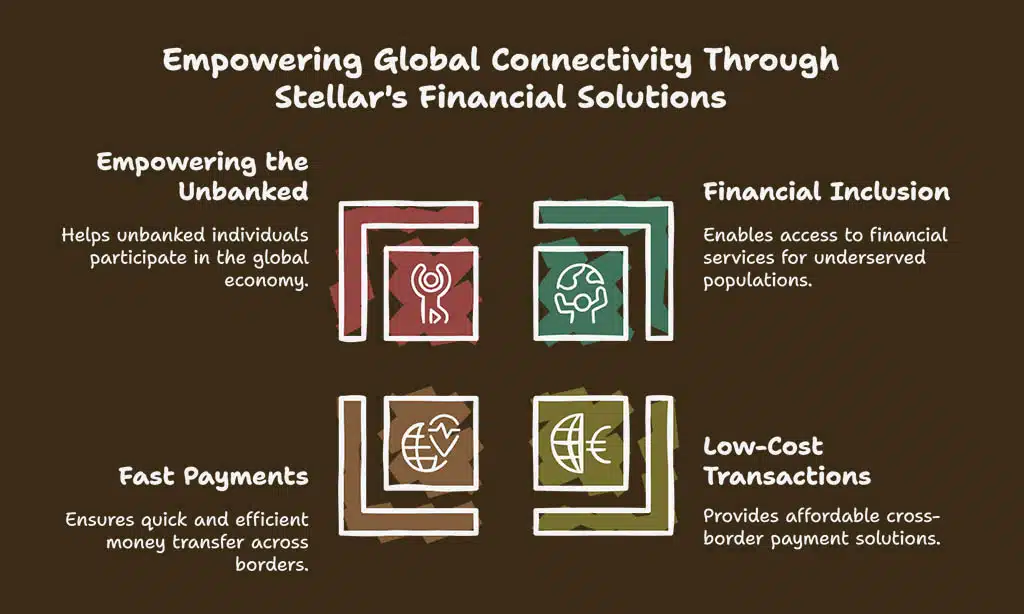Cryptocurrency is changing the world. Crypto Projects Making A Difference In The World are not just about digital money. They solve real problems and help people globally.
Take Ethereum, for example. It powers decentralized apps and smart contracts. Cardano focuses on energy efficiency and scalability. Stellar helps unbanked people with low-cost cross-border payments.
VeChain improves supply chain transparency. Polkadot connects different blockchains for better collaboration.
These projects show how technology can make life easier and fairer. Ready to explore more? Keep reading.
Key Takeaways
- Ethereum uses smart contracts for DeFi apps; lets users borrow or lend crypto quickly without banks or extra costs.
Ethereum (ETH): Powering Decentralized Applications
Ethereum fuels decentralized apps with its smart contract technology. It’s the backbone of DeFi, enabling financial tools without middlemen.
Supporting Smart Contracts and DeFi Innovations
Ethereum powers decentralized applications through its support for smart contracts—automated agreements that run without intermediaries—making processes faster and fairer!
This technology fuels decentralized finance innovations, allowing users worldwide to access loans securely using cryptocurrency tokens like tether (usdt) instead of personal banks, which often require extensive paperwork and incur high costs.
Additional Insights on Ethereum (ETH):
- Benefit: Accelerates financial transactions via smart contracts and DeFi innovations.
- Challenge: Faces network congestion and regulatory uncertainties.
- Example: Peer-to-peer network lending using tether (usdt) helps expand access to capital.
Cardano (ADA): Advancing Sustainability and Scalability
Cardano (ADA) focuses on energy efficiency and academic research, making it a leader in sustainable blockchain solutions—keep reading to see how it’s shaping the future.
Focus on Energy Efficiency and Academic Research
Cardano stands out by using proof-of-stake (PoS) instead of proof-of-work, making it more energy efficient. Peer-reviewed academic research drives its development and ensures scientifically sound advancements.
This approach helps tackle scalability issues faced by many blockchains. Its commitment to sustainability appeals to environmentally conscious users aiming to reduce carbon footprints commonly associated with crypto mining.
By combining rigorous research and eco-friendly practices, Cardano offers scalable solutions for decentralized applications and paves the way to a greener future.
Additional Insights on Cardano (ADA):
- Benefit: Provides energy-efficient blockchain solutions through proof-of-stake (PoS).
- Challenge: Must continue innovating to address emerging scalability issues.
- Consideration: Emphasizes academic research and peer review to strengthen credibility.
Stellar (XLM): Promoting Financial Inclusion
Stellar (XLM) connects people worldwide through fast, low-cost cross-border payments. It bridges gaps for the unbanked, offering access to financial tools they’ve long been excluded from.
Facilitating Cross-Border Payments for the Unbanked
Stellar (XLM) focuses on providing financial services to underserved populations. Its blockchain technology enhances cross-border payment systems with low transaction fees. This makes it easier for people without bank accounts to send and receive money globally.
The platform supports financial inclusion through accessible digital currency solutions.
Cross-border payments often come with high costs and delays. Stellar eliminates these barriers by offering fast, affordable transactions. It connects banks, payment systems, and individuals directly.
This peer-to-peer network reduces reliance on traditional financial systems. The goal is to empower the unbanked and bring them into the global economy.
Additional Insights on Stellar (XLM):
- Benefit: Offers low-cost, rapid cross-border transactions.
- Opportunity: Expands financial access for underserved communities.
- Note: Combines blockchain technology with a clear focus on financial inclusion.
VeChain (VET): Revolutionizing Supply Chain Management
VeChain (VET) is transforming how businesses track goods from start to finish. Its blockchain tech boosts transparency and cuts fraud in supply chains worldwide.
Enhancing Transparency and Product Tracking
VeChain uses blockchain technology to improve supply chain transparency. It creates an immutable ledger that records every step of a product’s journey. This reduces fraud and counterfeiting by verifying authenticity at each stage.
Real-time tracking of goods is another key feature. Businesses can monitor products from production to delivery, enhancing logistics management. This ensures efficiency and builds trust with consumers through clear, traceable data.
Additional Insights on VeChain (VET):
- Benefit: Enhances supply chain transparency with an immutable ledger.
- Challenge: Requires widespread industry adoption for optimal performance.
- Example: Real-time tracking systems improve logistics and reduce counterfeiting.
Polkadot (DOT): Connecting Blockchain Networks
Polkadot links different blockchains, letting them share data and work together seamlessly—ready to see how it’s changing the game? Keep reading!
Enabling Interoperability and Collaboration Across Platforms
Polkadot connects multiple blockchains into one unified network. This allows different chains to share resources and work together. It supports seamless communication between platforms, making transactions faster and more efficient.
By enabling interoperability, Polkadot breaks down barriers between isolated blockchain systems.
The platform promotes collaboration across decentralized applications (dapps) and peer-to-peer networks. Developers can build on Polkadot’s framework without worrying about compatibility issues.
Its proof-of-stake (PoS) mechanism ensures secure and scalable interactions. With this approach, Polkadot fosters innovation in the decentralized finance (DeFi) space while simplifying cross-chain operations for users worldwide.
Additional Insights on Polkadot (DOT):
- Benefit: Unifies blockchain networks and supports efficient data sharing.
- Challenge: Integrating diverse blockchains may require technical adjustments.
- Consideration: Its proof-of-stake (PoS) mechanism enhances both security and scalability.
Takeaways
Crypto projects are reshaping industries and lives. Ethereum fuels innovation, while Cardano focuses on sustainability. Stellar brings banking to the unbanked, VeChain ensures transparency, and Polkadot connects diverse blockchains.
Together, they’re building a better financial future for all.
FAQs
1. What are some crypto projects helping the world?
Projects like Ethereum, Solana, and Cardano use smart contracts to build decentralized apps. They also support DeFi and NFTs, which change how people handle money and art.
2. How does Ethereum make a difference?
Ethereum’s blockchain powers decentralized finance (DeFi) and non-fungible tokens (NFTs). It lets developers create dapps for peer-to-peer networks without middlemen.
3. Why is Binance Coin important?
Binance Coin runs on the BNB Chain, making transactions faster and cheaper. It’s used in decentralized exchanges and helps users trade crypto assets easily.
4. Can Dogecoin be more than just a meme coin?
Yes! Dogecoin started as a joke but now supports quick payments online. Its community often donates to charities, showing it can do good too.
5. What makes Solana stand out among cryptos?
Solana uses proof-of-stake to process transactions quickly at low costs. Its blockchain hosts many dapps, from gaming to DeFi platforms, making it versatile for users worldwide..
Disclaimer: This content is informational only and should not be considered financial advice.






































